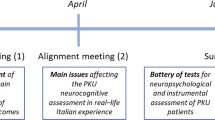Abstract
In a retrospective study, 34 early treated, normally intelligent adolescents with phenylketonuria (PKU) and their parents were tested with several psychometric personality inventories and self-developed questionaires concerning their psychosocial situation and their disease-and diet-specific knowledge. Results show that the patients are characterized by less autonomy, a more negative evaluation of their scholastic ability, less achievement motivation, less extraversion and impulsiveness, a feeling of not being quite healthy, more grave and a higher level of dependency from their families. The patients saw their whole social situation as being destinctly restricted. Their knowledge concerning disease and diet was alarmingly poor and the majority had great difficulties in managing the diet satisfactorily without parental help. Up to the age of 15 years the serum phenylalanine levels were persistently above the desired range.
Similar content being viewed by others
Abbreviations
- IQ:
-
intelligence quotient
- Phe:
-
phenylalanine
- PKU:
-
phenylketonuria
References
Acosta PB, Trahms C, Wellmann NS, Williamson N (1983) Phenylalanine intakes of 1-to-6-years old children with phenylketonuria undergoing therapy. Am J Clin Nutr 38:694–700
Awiszus D, Unger I (1990) Coping with PKU: results of narrative interviews with parents. Eur J Pediatr 149 [Suppl 1]:45–51
Blascovis ME, Scheffler GE, Hack S (1974) Phenylalaninemia. Differential diagnosis. Arch Dis Child 49:835–843
Brunner R, Berry H (1987) Phenylketonuria and sustained attention: The continous performance test. Int J Clin Neuropsych 9:68–70
Dobson JC, Williamson ML, Azen C, Koch R (1977) Intellectual assessment of 111 four year old children with phenylketonuria. J Pediatr 5:53–56
Fahrenberg J, Hampel R, Selg H (1983) Das Freiburger Persönlichkeitsinventar (FPI-R), Verlag für Psychologie Der CH Hogrefe, Göttingen
German Paediatric Society (1990) Limits in serum phenylalanine concentrations of different ages. Convention of the “Deutsche Arbeitsgemeinschaft für Pädiatrische Stoffwechselerkrankungen”. Monatschr Kinderheilk 138:636
Holtzman N, Richard M, Kornmal A (1986) Effect of age at loss of dietary control on intellectual performance and behavior of children with phenylketonuria. N Engl J Med 314:593–598
Jäger R, Berbig E, Geisel B, Gosslar H, Hagen J, Liebich W, Schafheutle R (1973) Mannheimer Biographisches Inventar (MBI), Verlag für Psychologie, Dr. H.J. Hogrefe, Göttingen
Petermann F, Noeker M, Bode U (1987) Psychologie chronischer Krankheiten im Kindes- und Jugendalter. Psychologie Verlags-Union, München-Weinheim
Realmuto G, Garfinkel BD, Tuchmann M, Tsai MT, Chang PN, Fisch RO, Sharpio S (1986) Psychiatric diagnosis and behavioral characteristics of phenylketonuric children. J Nerv Ment Dis 174:536–540
Reber M, Kazak AE, Himmelberg P (1987) Phenylalanine control and family functoning in early treated phenylketonuria. Dev Behav Pediatr 8:311–317
Schmidt H, Mahle M, Michel U, Pietz J (1987) Continuation vs discontinuation of low-phenylalanine diet in PKU adolescents. Eur J Pediatr 146 [Suppl 1]:A12-A16
Seitz W, Rausche A (1976) Persönlichkeitsfragebogen für Kinder (PFK 9-14). Westermann-Verlag Braunschweig
Smith I, Beasly MG, Wolff OH, Ades AE (1988) Behaviour disturbances in 8-year-old children with early treated phenylketonuria. J Pediatr 112:408
Sonneville LMJ de, Schmidt E, Michel U, Batzler U (1990) Preliminary neuropsychological test results. Eur J Pediatr 149 [Suppl 1]:A39-A44
Tanner JM (1962) Wachstum und Reifung des Menschen. Thieme-Verlag, Stuttgart
Weiß RH (1987) Grundintelligenztest Skala 2 CFT 20. Verlag für Psychologie, DR CJ Hogrefe Göttingen
Wendel U, Ullrich K, Schmidt H, Batzler U (1990) Six-year follow up of phenylalanine intakes and plasma phenylalanine concentrations. Eur J Pediatr 149 [Suppl 1]:13–16
Zwiauer K, Widhalm S, Scheibenreiter S, Knoll E (1990) Longterm intellectual development in 86 children with phenylketonuria (PKU) Pediatr Res 28:74
Author information
Authors and Affiliations
Rights and permissions
About this article
Cite this article
Weglage, J., Fünders, B., Wilken, B. et al. Psychological and social findings in adolescents with phenylketonuria. Eur J Pediatr 151, 522–525 (1992). https://doi.org/10.1007/BF01957759
Received:
Accepted:
Issue Date:
DOI: https://doi.org/10.1007/BF01957759




